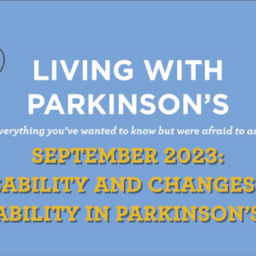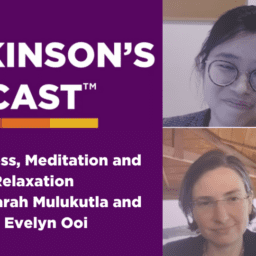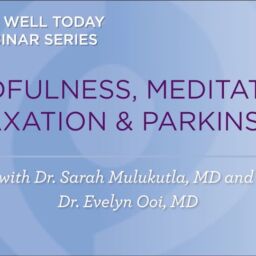NOTE: Want another webinar on mindfulness? Check out this one on Mindfulness, Meditation, Relaxation, and Parkinson’s here.
Over the past several years, we have shared stories, podcasts, and webinars about the benefits of mindfulness and meditation, practices that have been around for thousands of years. The practice of mindfulness, beneficial to everyone, can be particularly beneficial for people experiencing anxiety and depression, two common non-motor symptoms of Parkinson’s. That’s not all it can improve, however. Here, we’ll turn our attention to a specific form of mindfulness therapy, Mindfulness-Based Stress Reduction (MBSR), and how it can help improve not just depression and anxiety but also pain, focus, energy, resiliency, and more.
Mindfulness: The Basics
Mindfulness is intentional, active awareness of the present moment, observed without judgment. Through mindfulness, we can improve our ability to live in the moment, put aside thoughts and concerns about the past or future, and appreciate the present. It can help build a sense of gratitude in small things, and it can help us take a step back from our busy lives and minds and look at our daily experiences as an uncritical observer.
MBSR: The Basics
Developed at the University of Massachusetts Medical School in 1979 by Dr. Jon Kabat-Zinn, PhD, MBSR initially focused on stress management. Since its creation, however, the therapy has evolved to include treating a variety of health-related conditions, from anxiety and depression to immune disorders, skin diseases, pain, diabetes, and hypertension.
Standard MBSR therapy consists of an eight-week course consisting of two and a half hours of online meetings each week and one all-day retreat. Throughout the program, participants learn about the fundamentals of mindfulness, different mindfulness and meditation practices, how to examine their perspectives, how to react to stressful situations mindfully, and how to integrate mindfulness into their everyday lives.
We begin to realize that there is more “right” with us than “wrong” with us as we become more engaged in our lives. Many of the effects of mindfulness meditation found in scientific research include a decrease in psychological symptoms such as anxiety and depression and greater stability in physical symptoms such as blood glucose levels and blood pressure.
-University of Massachusetts Medical School
Worldwide, more than 200 medical centers offer MBSR therapy as a complementary treatment for symptoms associated with physical, psychosomatic, and psychiatric disorders, and since 1979, more than 25,000 people have completed the training.
MBSR in Practice
One of these people is Kevin Kwok, a member of the Davis Phinney Foundation board of directors and YOPD Council. Kevin was a participant in an eight-week study led by researchers at Stanford University on MBSR’s impacts. He says its effects on his quality of life were even better than he had expected.
 Although he’d practiced mindfulness and meditation before, he had never done so in a formal setting like the one that MBSR therapy offers. In this setting, Kevin says, he was able to look at mindfulness in a new way. “Before, it was nice to do, but like any other exercise, you lose it if you don’t do it. For me, in the past, it was like, ‘I’ll get to that when it’s convenient. Right now, it’s a little too busy, a little too hectic to fit this in.'”
Although he’d practiced mindfulness and meditation before, he had never done so in a formal setting like the one that MBSR therapy offers. In this setting, Kevin says, he was able to look at mindfulness in a new way. “Before, it was nice to do, but like any other exercise, you lose it if you don’t do it. For me, in the past, it was like, ‘I’ll get to that when it’s convenient. Right now, it’s a little too busy, a little too hectic to fit this in.'”
At the beginning of the study, the Stanford research team did a baseline assessment of each participant’s anxiety and depression levels. Participants then practiced mindfulness each day, keeping a journal of their experiences, and attended a once-per-week class where they were taught different mindfulness and meditation methods. After the eight weeks, the group was reassessed, and Kevin found that his anxiety score had fallen to the point where he was no longer reporting anxiety. “And the depression score was even more remarkable,” he says. “I had lost the sense of ‘blueness’ I had been feeling.”
And although the study wasn’t evaluating mindfulness’s direct impacts on Parkinson’s symptoms themselves, Kevin noticed that he experienced less dystonia by building his mindfulness practice.
I now have a new tool that I put in my medicine cabinet called meditation. I put it right up there with daily exercise—it’s that impactful to me.
-Kevin Kwok
MBSR Research
Data confirms Kevin’s personal experience, showing that MBSR is an effective complementary therapy for a wide variety of medical and psychological conditions, including:
- Anxiety
- Asthma
- Cancer
- Chronic pain
- Depression
- Diabetes
- Fibromyalgia
- Gastrointestinal disorders
- Heart disease
- HIV
- Hot flashes
- Hypertension
- Mood disorders
- Sleep disturbances
- Stress disorders
In addition, studies have shown that mindfulness practices like those offered in MBSR therapy can help reduce fatigue, pain, and addiction and may also have the ability to strengthen a person’s immune system.
Get Involved
With many studies showing how MBSR can positively impact various health issues, Parkinson’s researchers at the VA San Diego Healthcare System are now exploring how it might affect anxiety, depression, cognition, motor symptoms, and disease severity in people with Parkinson’s. Interested in learning more? Visit the clinical trial webpage here.
Learn More about MBSR and Mindfulness
UMass Medical School: MBSR Training
Mindfulness-based Stress Reduction: A Non-pharmacological Approach for Chronic Illnesses
Mindfulness-Based Stress Reduction in Parkinson’s
MBSR: 25 Mindfulness-Based Stress Reduction Exercises and Courses
Mindfulness Meditation: A Research-proven Way to Reduce Stress
















